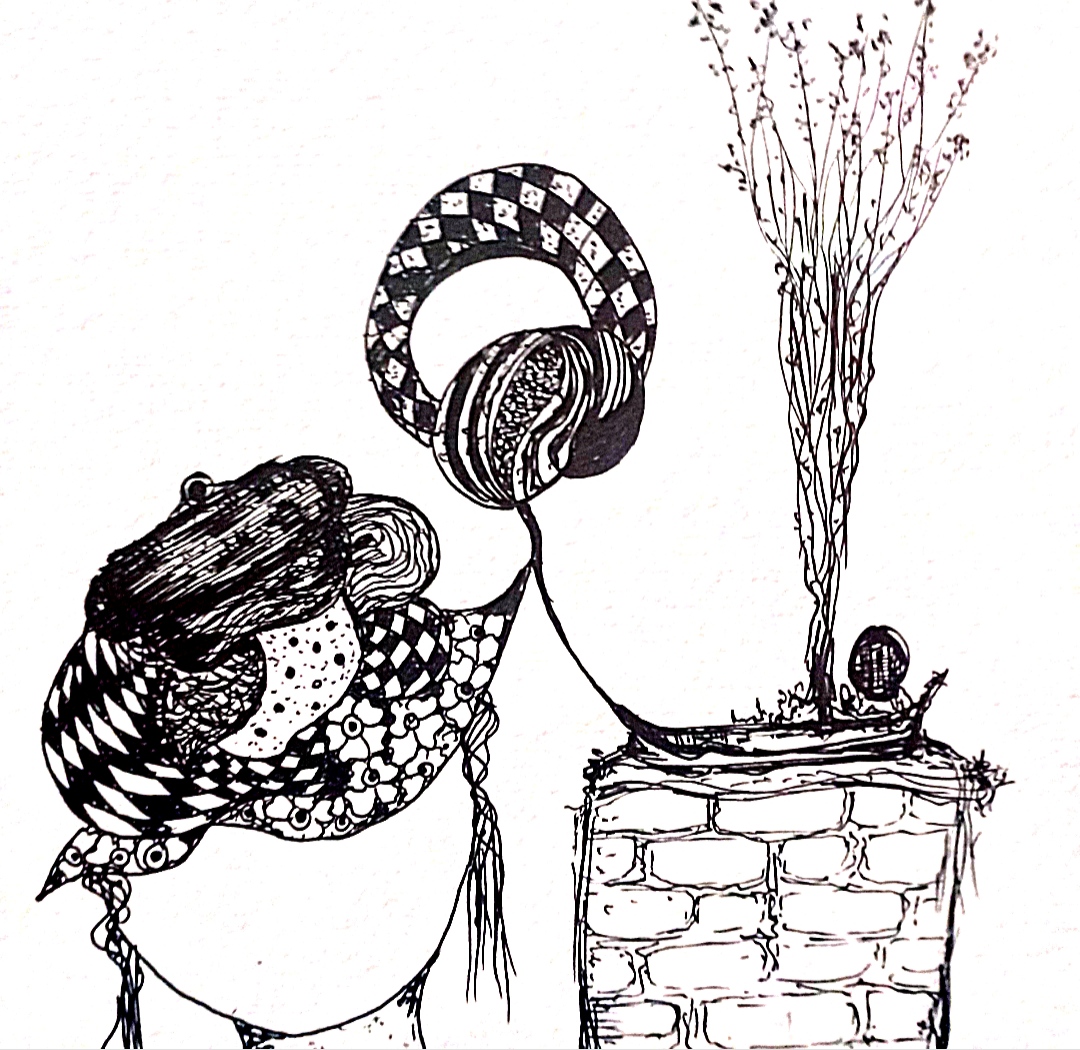
Our Masters
Kabir
Kabir was born in Varanasi around the beginning of the fifteenth century in a class of weavers. His verses were composed orally and collected by disciples and admirers after varying periods of circulation. He is generally assumed to have been illiterate, and no critic fails to quote the famous verse:
I don’t touch ink or paper,
this hand never grasped a pen.
The greatness of four ages
Kabir tells with his mouth alone. (sa. 187)
Though of course we cannot prove his illiteracy or his innocence of contact with ink or paper, the notion that he insisted on oral transmission accords well with the gist of his teaching. Of all the terms he used to refer to the enlightenment experience or the means of reaching it. He stresses direct contact with the teacher, indicating that the only authentic teaching is the word from the guru’s mouth (sa.82).
While there is evidence that both Hindus and Muslims were ready to assault Kabir physically during his lifetime, they have since his death been ready to assault each other over the privilege of claiming him as their own. A famous legend about Kabir shows his Hindu and Muslim followers massed for combat after his death, each side demanding to take charge of the body. But before the first blow is struck, someone removes the shroud to discover that a heap of flowers has replaced the cadaver. The two religious groups divide the flowers, and each goes off to bury or burn its half according to prescribed rituals.
Kabir was a poet, and a radical reformer, though society was only the outermost skin of what he wished to reform.
(As written in “The Bijak of Kabir” Translated by Linda Hess and Shukdev Singh )
( Following poems taken from “The Bijak of Kabir” Translated by Linda Hess and Shukhdev Singh)
Sabada
*
Saints, once you wake up, don’t doze off.
Time can’t eat you, eons can’t swallow you,
age and decay can’t waste you.
Turned-around Ganga dries up the ocean,
swallows the moon and sun.
The sick man rests, having toppled nine houses.
A shadow burns on the water.
A man without feet runs everywhere,
without eyes sees the world.
Turned-around rabbit swallows a lion.
Marvelous! Who understands?
An upside-down pot won’t go under,
a straight pot fills with water.
A man stays separate for his own reasons,
the guru’s grace brings him over.
In his cave he sees the world,
outside he sees nothing.
Turned-around arrow strikes the hunter,
the fearless understand.
The singer never sings,
the silent one sings always.
The actor plays, he sees
the show, a boundless love
still grows, he seeks
his own sound, his own
seed-this story
can’t be told.
Turned-around earth pierces the sky,
the great being speaks.
Without a cup nectar is sipped,
streams swell with water.
Kabir says, he lives from age to age
who tastes the liquor of Ram.
**
Saints, I see the world is mad.
If I tell the truth they rush to beat me,
if I lie they trust me.
I’ve seen the pious Hindus, rule-followers,
early morning bath-takers-
killing souls, they worship rocks.
They know nothing.
I’ve seen plenty of Muslim teachers, holy men
reading their holy books
and teaching their pupils techniques.
They know just as much.
And posturing yogis, hypocrites,
hearts crammed with pride,
praying to brass, to stones, reeling
with pride in their pilgrimage,
fixing their caps and their prayer-beads,
painting their brow-marks and arm-marks,
braying their hymns and their couplets,
reeling.’ They never heard of soul.
The Hindu says Ram is the Beloved,
the Turk says Rahim.
Then they kill each other.
No one knows the secret.
They buzz their mantras from house to house,
puffed with pride.
The pupils drown along with their gurus.
In the end they’re sorry.
Kabir says, listen saints:
they’re all deluded!
Whatever I say, nobody gets it.
It’s too simple.
***
Seekers, the house is full of quarrels.
Night and day they’re at each other’s throats,
five fellows and a woman.
Everyone wants a different diet,
and those five have big appetites.
No one listens to anyone else,
they just follow their own whims.
Wipe out that bad-thinking, bad-luck woman,
crush those boys!
Kabir says, my kind of people
can settle these household frays.
**
Saints, a huge surprise:
If I tell, who will believe it?
Just one man, just one woman-
imagine that!
In just one egg all eighty-four,
and a universe
lost in delusion.
Just one woman spread her net,
the world filled with confusion.
Searching, they couldn’t find the end,
not Brahma, Vishnu or Shiva.
The snake-noose tightens in the body,
the world’s plundered, they struggle
without the sword of knowledge,
no one can lay a hand on her.
She alone is root, flower, garden,
she herself plucks and eats.
Kabir says, only those are free
whom the guru has shaken awake.
***
Saints, a great surprise.
A son grabbed his mother,
a crazy girl took off with her father
and stayed a virgin.
She dropped her husband
and went with her father-in-law.
Would you believe it?
With her brother she went
to the in-laws’ house
and played jealous co-wife
with her mother-in-law.
Husband’s sister and brother’s wife
hatched plots, and used my name.
She never went near the in-laws’ in-laws2
but easily took over
the household.
Kabir says, seekers, listen:
one born a man
became a woman.
****
Saints, if I speak
who will believe it?
If lie
it passes for truth.
I glimpsed a jewel,
unpierced and priceless,
without buyer or seller.
Glittering, gleaming, it flashed
in my eyes, and filled
the ten directions.
A touch of grace
from the guru:
the invisible, mark less
appeared.
Simple meditation,
absolute stillness1
awakened. Simply
I met Ram.
Wherever I look,
only this, only this.
The diamond pierced
my ruby heart.
Through the guru
comes the supreme.
Thus teaches Kabir.
*****
Seekers, what comes and goes is Maya.
The guardian knows no time,
never went anywhere, never came.
The beloved — could he be a turtle or a fish?
Does he go around killing goblins?
He is kind, he knows no rancor.
Tell me, who should he kill?
Don’t call the master a boar,
he never held this heavy world.
Such work is not the lord’s,
the world lies.
Everyone believes in the fellow
who burst from a pillar;
but he whose claws ripped out the king’s belly,
he’s not the maker.
That dwarf-shape didn’t test Bali,
the tester was Maya.
Witless, the whole world reels in confusion,
Maya’s delusion.
Parashuram never slew any princes,
Maya pulled that trick.
The guru knows nothing
of devotion or separation
the creatures are deceived.
The creator didn’t marry Sita,
didn’t tie up the sea with stones.
Those who pray to Raghunath as the one
are praying in the dark.
With cowherds and milkmaids
he didn’t come to Gokul,
the maker never killed Kamsa.
He is gracious, everyone’s lord,
doesn’t conquer, doesn’t defeat.
Don’t call the master Buddha,
he didn’t put down devils.
They call these the maker
in mindless confusion,
Maya’s delusion.
The maker won’t become Kalki,
won’t beat up a future fiend.
Maya setup all these traps
to drive the pure ones from their paths.
The ten avatars are divine malarkey
for those who really know.
Kabir says, pay attention saints:
only second things bloom and blow
*****
Saints, they’re flushed, they’re drink-drunk!
They tippled a couple of cups
of that sweet juice of love
and flushed seven colors of drunk.2
They built a distillery, mixed
higher and lower, then drained the lip-puckering
dregs. No more dirty reactions.3
They plugged up Passion’s holes. Now the juice
runs endlessly down the chute.
Gorakh, Vasishtha, the bard Vyasa, Narada, Shukdev
clasp hands,
while in a tight clutch sir Shiva and Brahma’s boys,
heads back, lips curled like teacups.
Likewise Ambarishi, Yagyavalkya, and that fool
Jarabharat, along with Vishnu’s serpent,
his thousand mouths gaping. How high should I count?
Homeless ones, palace dwellers, mad.
Dhruva, Prahlad, Vibhishan, drunk. The woman who tasted plums
for Ram, stoned out of her mind.4
The ineffable Absolute, drunk in Vrindavan,
still can’t shake off the hangover.
Gods and sages, males and females,
Hindus and Muslims — drinkers are knowers.
Sugar in a dumb man’s mouth. How (asks Kabir)
to describe it?
******
Saints, I’ve seen both ways.
Hindus and Muslims don’t want discipline,
they want tasty food.
The Hindu keeps the eleventh-day fast1
eating chestnuts and milk.
He curbs his grain but not his brain
and breaks his fast with meat.
The Turk prays daily, fasts once a year,
and crows “God! God!” like a cock.
What heaven is reserved for people
who kill chickens in the dark?
For kindness and compassion
they’ve cast out all desire.
One kills with a chop, one lets the blood drop,
in both houses burns the same fire.
Turks and Hindus have one way,
the guru’s made it clear.
Don’t say Ram, don’t say Khuda.
So says Kabir.
**
Saints, the Brahmin is a slicked-down butcher.
He slaughters a goat and rushes for a buffalo
without a twinge of pain in his heart.
He lounges after his bath, slaps sandal paste
on his brow, does a song and dance
for the Goddess, crushes souls
in the wink of an eye
the river of blood flows on.
How holy! What a superior race! What authority
in society, and how people grovel
to get his initiation!
It makes me laugh.
They tell tales about ending sin
but their actions are base.
I’ve seen two of them throttle each other,
but Yama carted off both.
Kabir says, saints, this is Kaliyug:
the age of phony Brahmins.
**
Oh Ram! The knot of confusion
won’t loosen, so Death
keeps plucking you off.
Monks and yogis give up their pedigrees
but still brag of their lineage.
Knowers and heroes, poets, philanthropists,
people with all sorts of talents
can’t break through
this state of mind.
They read hymns, legends and laws
but miss the experience.
How can iron turn to gold
without touching the touchstone?
If you don’t cross over alive,
how can you cross when you’re dead?
Alive, you’re not crossing!
Wherever you put your faith,
that’s where you’ll be at death?
Clever man! Whatever you’ve done,
wise or foolish, try to understand.
Kabir asks: what can you say about people
who don’t see what they’re staring at?


